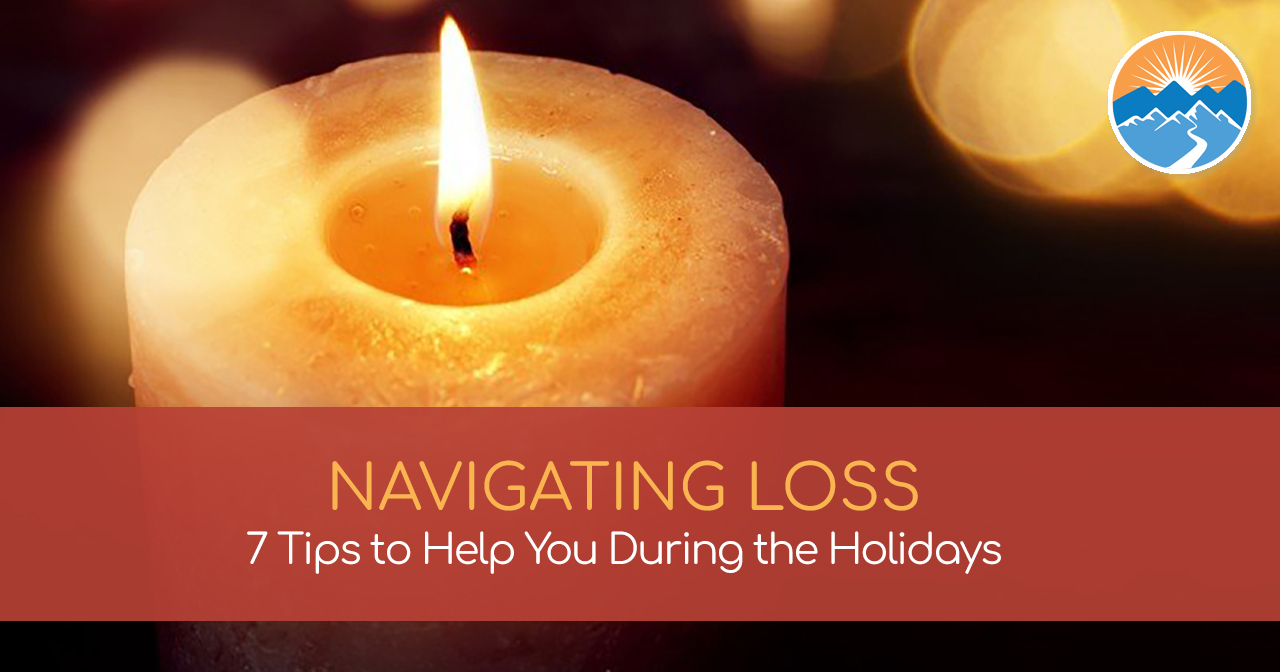For those that have experienced loss, the holidays can be a tough time. Mourning a spouse, child, other family member, or even a pet can make it difficult to get through what should is supposed to be “the most wonderful time of the year”.
Dr. Moira Somers, a neuropsychologist and leading practitioner in the field of financial psychology and financial change, says that mental energy is a renewable resource. However, this energy is limited, drawn down by the tasks of daily living. Activities like eating and sleeping help to renew it, but for someone going through the holiday season without a loved one, the management of emotional pain and stress can reduce mental energy faster than it can be renewed, leaving them drained.
The following seven tips can help someone experiencing loss navigate the holidays and maintain their well-being. It is important to note that these are real-life examples provided by my clients that have experienced loss, shared with the hope of helping others going through a similar situation.
1. Plan ahead
Holiday events and invitations can fill our calendars. Dr. Somers explains that one of the areas where we direct mental energy is controlling emotional displays in social situations. Controlling what’s going on inside you creates fatigue, so consider your level of energy when making plans.
Look at the calendar and identify events and activities that may be emotionally difficult to navigate.. Assess each one and decide if it makes sense to go at all. Consider who else will be in attendance and whether that list includes anyone you can count on for support or who may trigger you. You may invite someone who is a support to join you. If the event might be too much for you, then it’s okay to take care of yourself and stay home.
If you are having trouble deciding whether or not to accept an invitation, consider contacting the host in advance to let them know that it’s a difficult time and hard to predict how you will feel. You may need to cancel at the last minute – check if this will be a problem for them. If not, then no need for guilt or pressure if you do cancel. What’s more, if you do attend, your host will be aware of the challenge and understand if you need to leave early.
2. Let yourself off the hook
The holiday to-do list can be overwhelming for anyone. Add on grieving the loss of a loved one and it’s even more important to focus on reducing your commitments. If you can’t do everything that you normally do for the holidays, it will be okay. This may mean a deviation from tradition. Presents don’t need to be perfectly wrapped. In fact, if it feels right you don’t need to do presents at all. You may decide to skip decorating or forego sending cards. The key is don’t take on more than you can handle, and don’t for a second feel bad about things you’re not doing. You only have so much mental energy, and you need to make sure it’s directed in the right places, including taking care of yourself.
3. Ask for help
Perhaps you have had a tradition of hanging lights or other decorations, or picking out the perfect gifts. but you don’t have the energy to do it. This too is normal. Don’t be afraid to ask for help. Asking for help isn’t a sign of weakness. It allows those that care about you to step in and show it. And you may find that people who don’t know how to help you emotionally have been waiting for just this moment, when they can grab a box of lights or a roll of wrapping paper and feel useful.
4. Keep busy
Staying busy can help you find purpose and community. Think fun and restorative activities – not spending extra time at work. Now is the time to keep up your hobbies or find new things that you like to doto occupy your time and thoughts. Spend time doing fun activities with friends and family. Or volunteer. Doing things for others can be helpful because when you’re aware of someone else’s challenges it can take the focus away from your own. .
5. Remember loved ones
When you’re emotionally ready, do something in remembrance of your loved one. Organize a family outing or event in their name. Set a place for them at the dinner table during the holidays when the family is gathered. Light a candle in their memory. Yes, there was a loss. Someone significant is no longer here, and this gives you space to acknowledge that and remember them around others you care about who feel the same loss.
6. Know what doesn’t work
It’s important to know what doesn’t work for you so you can plan around or avoid things that trigger negative emotions. It might be holiday commercials or images of family gatherings on social media. If so, consider avoiding TV or social media until the holidays pass. Large gatherings may create sensory overload. If so, take a friend who can help recognize when you are getting overwhelmed and need to leave. And remember – it’s okay for some things to not work right now. What’s most important is to take care of yourself.
7. Do something different
Another option is to break your routine. Take a trip. Get away from what’s familiar and possibly painful and see somewhere new. However, it’s recommended that you take a friend or travel to one. Going alone could trigger feelings of loneliness, especially when you see other people happily on vacation with their spouse or loved ones around you.
At Gates Pass Advisors, your mental health is as important to us as your financial health. These seven suggestions are from our own clients who, like you, have experienced loss. You are not alone. If you would like to schedule a complimentary meeting or receive a complimentary booklet from Dr. Moira Somers that provides more information on what depletes and how to refill your mental energy, just use the Contact link at the top of the page to reach out to us.
| Categories:




